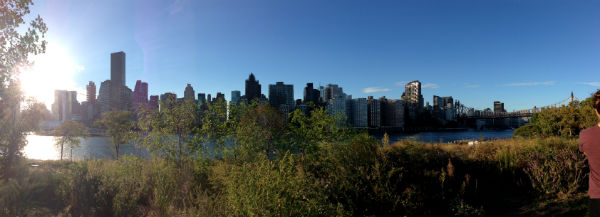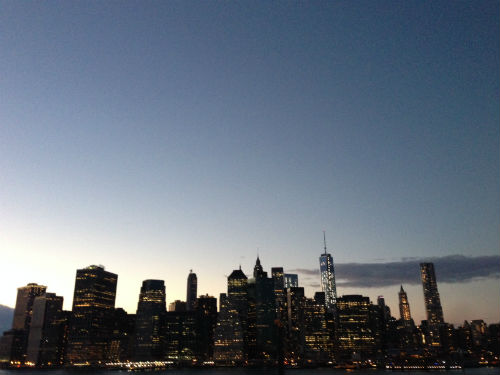The Statue of Liberty, Brooklyn Bridge, Empire State Building and Times Square – these are all landmarks of the New York City (NYC) skyline that we always see in blockbuster movies and tourist brochures. These images paint a picture of NYC as a scenic and picturesque city that never sleeps. What is it like living in NYC? I spoke to two Americans about working and living there.
Julia Matsouka, 25, is my childhood friend. She is working in the area of Business Operations and Administration in NYC. She has lived there since her childhood days and grew up in the United States (USA). Today, she considers herself a full-blooded American.
Jeremy Kim, 26, was born in America and has lived in NYC for his entire life. He also works in the Business Operations and Administration field.
To find out what Julia and Jeremy have to say about the job market and working in NYC, do read my interview with them.

Grand Central, New York, the busiest train station in the country.
What is the job market like in NYC in the USA?
Julia: It depends largely on the city and field that you’re trying to get into. NYC definitely has plenty of opportunities, much more than anywhere else the States. I wouldn’t say that it’s easy to get a job, but the situation has improved from two to three years ago. Entry-level admin positions get hundreds of applicants, so having a connection within a company will drastically improve your chances of landing an interview.
Jeremy: I would say the job market is not good, but slowly improving. It seems better than it was a few years ago – when there was a recession. Friends and acquaintances searching for jobs have told me it has been difficult to find employment. A few family members have also lost work, due to downsizing and re-engineering.
How easy is it for graduates to get a job relating to their field of study in NYC?
Julia: Graduates with a liberal arts degree usually have a tougher time finding jobs. I would say graduates with very specific degrees (engineering, computer science, and so on) have an easier time finding positions in the tech industry.
Jeremy: It depends upon the field of study. In general, the assumption is that liberal arts graduates have a more difficult time gaining employment than graduates trained in more specific fields (like business, law, or medicine). I would say that it is a combination of prior experience, education, and luck. Many people gain employment through personal connections and networks.
What sort of degrees are more sought after by employers now – in NYC?
Jeremy: For the past several decades, NYC’s economy has been dominated by the F.I.R.E. industries – finance, insurance, and real estate. I think this has changed a bit in the past few years. I’m guessing that degrees in business are still popular, as well as those in the media industry.
What is the current average starting salary for a graduate there? And after five years of work experience?
Julia: Average starting salary varies greatly depending on your location and the industry. I would say anywhere from USD$39k per year to USD$45k per year. After five years, probably from USD$75k per year to USD$90k per year.
Julia: The average costs for two people living in NYC would be:
Food (including groceries and eating out): USD$1000 per month (USD$250 per week)
Public Transport: USD $244 per month
Utilities (electricity, gas, internet, cell phone): USD$300 per month. We don’t watch TV, but if you have cable you can add an extra USD$100 to your monthly bill.
Miscellaneous (movies, shopping, household supplies etc): USD$450 per month.
Jeremy: Location is important. It is generally considered to be more expensive to live in a large city (like NYC) than to live in the suburbs, or in smaller cities. In NYC, housing is more expensive (both to own and to rent), but the cost can be offset somewhat by the fact that many do not own a vehicle. Public transit is relatively cheap, compared to the cost in other large U.S. cities.
What are the costs of accommodation and housing like – in NYC for a couple?
Julia: Rent (for a one bedroom apartment in Brooklyn) would be USD$1,550 per month – although this is considered extremely low. Usually rent for a one bedroom apartment in Manhattan/upper parts of Brooklyn starts at USD$2000 per month.
I would say NYC has a drastically higher cost of living than any other parts of the U.S. For example, USD$1800 per month can get you a four-bedroom house with a back and front yard in San Diego, California. But in Los Angeles or San Francisco, it would only get you a one or two-bedroom apartment, depending on the area you’re in.
What is it like living and working with Americans?
Julia: I worked in Taiwan for a year prior to moving to NYC, and with that experience I would say that I have more independence when working here. In America, there’s less micro-managing, more trust from supervisors, and definitely more communication (both praise and criticism). But then again, it ranges depending on your work place, the industry you are in, and the specific team you have. I am lucky enough to be working with an awesome team, and I have plenty of friends who work under awful and unqualified managers.
Jeremy: In general, Americans are known for working longer hours than residents of other countries. The business culture here is still one of competition – we value individuals who work hard, and to a large degree, assume that hard work leads to success. I think this attitude is changing slowly, however, especially among younger people. Personally, I feel that economic, social, and cultural circumstances determine one’s success to a significant degree.





Leave a Comment